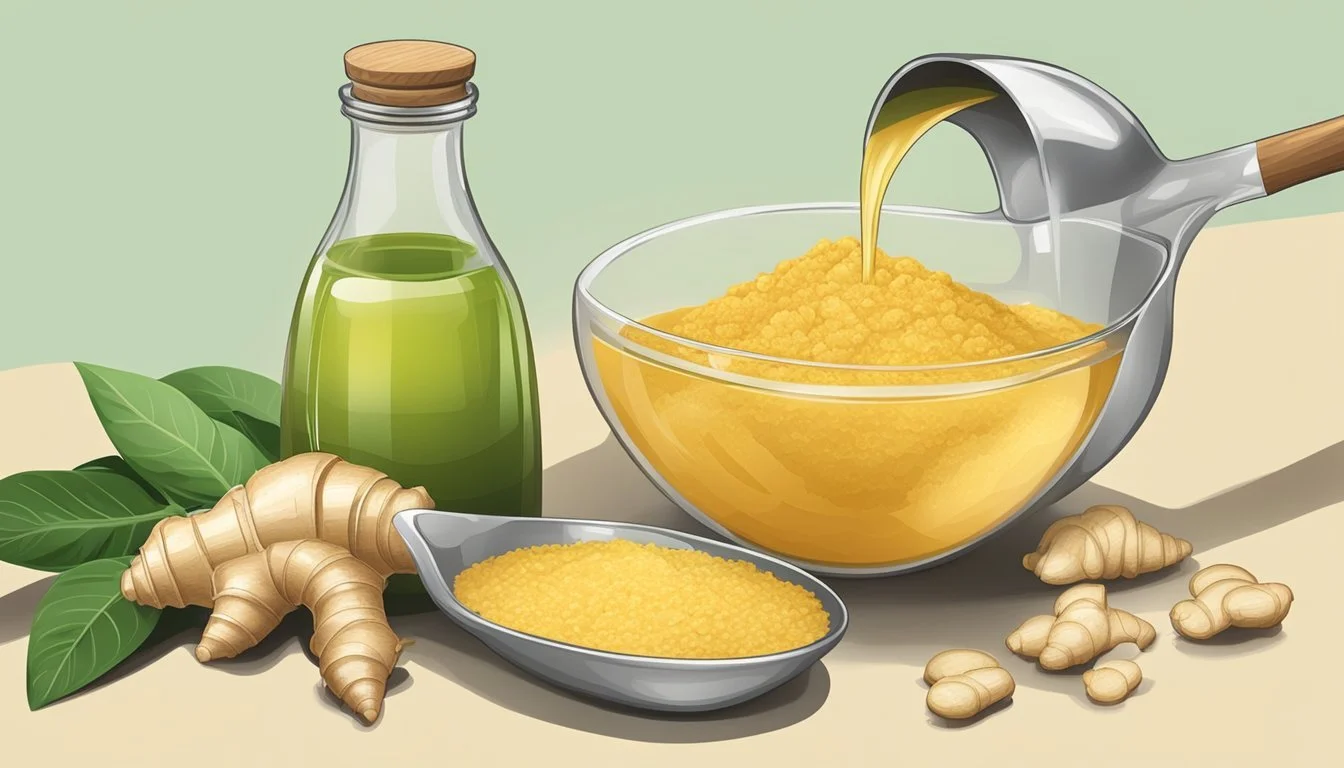How to Substitute Ginger Juice for Fresh Ginger
A Simple Conversion Guide
Ginger is a versatile and potent rhizome that has long been esteemed for its culinary and medicinal properties. When fresh ginger is not at hand, ginger juice can be an effective alternative to incorporate the distinct spicy and warm flavors ginger is known for. It is the liquid extracted from the root and possesses a concentrated flavor that can enhance both savory dishes and sweet creations. Its liquid form can be particularly convenient and desirable in marinades, dressings, and certain beverages, where it blends smoothly with other liquids.
When substituting ginger juice for fresh ginger, it is crucial to consider the intensity of the juice and how it might alter the moisture content of the dish. Generally, ginger juice is more potent than the equivalent quantity of fresh ginger, so adjustments in volume are necessary to achieve a comparable flavor profile without overpowering the dish. It's not a commonly used substitute, but in a pinch, ginger juice might serve as a suitable stand-in for its fresh counterpart in recipes where ginger's characteristic zesty taste is required.
Since ginger juice is concentrated, a small amount can go a long way. In recipes such as soups, stews, or baked goods, where fresh ginger is called for, an appropriate substitution ratio helps to ensure the resulting dish retains the desired ginger flavor without the bulk or fibrous texture that grated or minced fresh ginger would provide. Cooks often use ginger juice in meat marinades and sauces, where it can impart its flavor without altering the texture of the final product.
Understanding Ginger and Its Role in Recipes
Ginger is a versatile root known for its sharp, pungent taste and distinctive aroma, which it contributes to a range of culinary applications. It offers notable health benefits, and its preservation is key to enjoying its flavor.
The Unique Flavor Profile of Ginger
Ginger, commonly used in its fresh form, imparts a distinctively spicy and slightly sweet flavor profile that varies in intensity depending on its application. The fresh root introduces both zest and complexity to dishes, often contributing a pungent taste with a warm, woody aroma.
Health Benefits and Nutritional Value
The health benefits of ginger are well-documented; it is celebrated for its anti-inflammatory properties and ability to support immunity. Ginger contains gingerol, a compound with potent medicinal properties. Here are some specific nutritional benefits it offers:
Anti-inflammatory effects
Nausea relief
Immunity-boosting antioxidants
Culinary Uses Across Various Cuisines
Ginger is a staple in Asian cuisine, known for its essential role in flavoring stir-fry, soups, and marinades. But its use is not limited to savory recipes—ginger equally shines in sweet dishes, adding a zesty note to baked goods and sweet glazes. Here's how ginger is used in various cuisines:
Stir fry: Adds a fresh, vibrant taste.
Baked goods: Provides a warming spice note.
Marinades: Infuses meats with its bold flavor.
Soups: Lends depth with its spicy undertones.
Storage and Preservation of Ginger
Storing ginger correctly extends its shelf life and retains its robust flavor. Fresh ginger can be kept for a longer period when stored in the crisper drawer of a refrigerator or frozen. Ginger paste and minced ginger are convenient alternatives that save preparation time and are well suited for longer storage. Frozen ginger is especially handy as it grates easily and can be used directly in recipes.
Substituting Ginger Juice for Fresh Ginger
When a recipe calls for fresh ginger, ginger juice can be a convenient alternative. Its concentrated flavor requires careful measurement to maintain the intended taste profile of the dish.
General Guidelines for Substitution Ratios
In most recipes, one can substitute fresh ginger with ginger juice. Since ginger juice is more potent than fresh ginger, a good starting point is to use 1 teaspoon of ginger juice for every tablespoon of freshly grated ginger. The user should adjust the amount based on taste preferences and the strength of the ginger juice.
Adjustments for Savory Dishes
In savory dishes such as those involving meats or seafood, ginger plays a critical role in both flavor and marinades. Replace fresh ginger with ginger juice cautiously; too much can overpower delicate flavors. Begin with a small amount and season to taste, taking into consideration the other spice levels in the dish. If the recipe also includes salt, the user may need less than the recommended substitution ratio to prevent an overly salty result.
Adaptations for Sweet Recipes
For sweet recipes - like muffins or products involving sugar, honey, or another sweetener - the use of ginger juice should be measured and discreet. Ginger juice is not commonly used in baking, but when substituted for fresh ginger, it can provide the necessary flavor without affecting the dry ingredient balance. A modest amount can be experimented with, starting with approximately 1/4 teaspoon of ginger juice in place of 1 tablespoon of fresh ginger, and then adjusting for preferred sweetness and ginger intensity.
Alternative Ginger Substitutes
When substituting for fresh ginger, one can select from various alternatives across different categories, ranging from dry spices to fresh ingredients, ensuring compatibility with the intended recipe.
Dry Spice Alternatives
Dry spice substitutes include ground ginger, which provides a concentrated flavor: ½ teaspoon for every tablespoon of fresh ginger. But one can also consider other spices when in need:
Ground Cinnamon: Adds a woody and sweet flavor, suitable for both sweet and savory dishes.
Allspice: Offers a blend of cloves, pepper, and cinnamon notes, adding warmth to dishes.
Nutmeg and Mace: Both impart a sweet spiciness, with mace being subtler and nutmeg more intense.
Pumpkin Pie Spice Blend: Contains a mix of cinnamon, nutmeg, and other spices that mimic ginger's warmth.
Fresh Ingredient Substitutions
For a fresh twist, there are several alternatives to mimic fresh ginger's zesty kick:
Galangal: Closely related to ginger with a sharp, citrusy flavor.
Cardamom: Adds a spicy-sweet flavor that resembles ginger's complexity.
Horseradish: Provides a powerful heat, use sparingly as a substitute.
Tarragon: Offers a subtle hint of spice, appropriate for certain dishes.
Sweet Variant Replacements
When the recipe calls for a sweeter ginger profile, these options work best:
Crystallized Ginger: Swap with a 1:3 ratio; remember it's sweeter due to the sugar coating.
Candied Ginger: Similar to crystallized ginger but also good in desserts and baked goods.
Creating Blends and Mixes
Creating a homemade blend can provide a custom spice mix that stands in for ginger's unique flavor profile. Combine ingredients like cinnamon, nutmeg, and allspice to match the warmth and sweetness of ginger according to taste preferences.
Leveraging Liquid Substitutes
In recipes where liquid substitutes are appropriate, consider the following:
Ginger Tea: Can provide a mild ginger flavor in liquid form for soups and stews.
Lemon or Lime Juice: Offers a citrus tang that compensates for ginger's sharpness, especially in marinades.
Sugar Water: Mix with cinnamon sticks to create a spiced syrup, acting as a sweet ginger alternative.
Recipe-Specific Considerations
When substituting ginger juice for fresh ginger, it's crucial to consider the type of recipe and the role ginger plays in it. The conversion ratios, cooking methods, and desired end flavors must be carefully balanced to achieve the best results.
Adjusting for Baked Goods
For baked goods like muffins or breads, the intense flavor of ginger juice can be overpowering. One should use about 1/4 teaspoon of ginger juice for every tablespoon of fresh ginger called for in the recipe. This substitution may also require an adjustment of liquid ingredients to maintain the right consistency.
Tweaking for Savory Preparations
In savory dishes, such as sauces and marinades, one can be a bit more liberal with ginger juice. Use approximately 1/2 teaspoon of ginger juice to replace one tablespoon of grated fresh ginger. This ensures that the flavor blends seamlessly without dominating the dish.
Refining for Desserts and Sweet Treats
Sweet dishes often require a delicate balance of flavors. Substitute 1/4 teaspoon of ginger juice for one tablespoon of fresh ginger, especially in recipes like pumpkin pie. The natural sweetness of ginger juice may reduce the need for added sweeteners like sugar or honey.
Amending for Beverages
When making beverages such as ginger beer, which traditionally relies on fresh ginger for both its flavor and reported digestive benefits like easing nausea and motion sickness, ginger juice can serve as a potent alternative. For every teaspoon of grated fresh ginger in the recipe, use a 1/2 teaspoon of ginger juice. Adjust the amount of additional sweetener, if any, according to taste.
Using ginger juice in place of fresh ginger requires observation and slight alterations to complement each recipe uniquely.
Enhancing Flavor and Spiciness
When substituting ginger juice for fresh ginger, the key is to replicate not just the distinctive taste but also the spice and aroma. Attention must be given to the spiciness and warmth that fresh ginger imparts, ensuring the substitute preserves these qualities.
Using Spices to Mimic Ginger's Heat
To emulate the peppery heat of fresh ginger, one can blend various spices. Paprika offers a gentle warmth, while black pepper introduces a more pronounced spiciness. A careful combination can mimic the heat of ginger without overwhelming the dish.
Incorporating Sweetness with Care
Ginger has an innate sweet profile alongside its spiciness. To balance the zesty tang of ginger juice, a small addition of honey or sugar can be effective. However, one must use sweeteners judiciously to avoid dominating the other flavors.
Understanding the Balance of Aroma and Taste
Fresh ginger provides a harmony of taste and aroma, which ginger juice alone may not deliver. If the scent is too subdued, a pinch of tarragon can enrich the aroma, complementing the existing taste profile without distorting it.
Exploring the Tangy Alternatives
For a zestful twist, acidic ingredients such as pickled ginger, lime, or lemon juice can offer a tanginess that parallels fresh ginger's vibrancy. These alternatives contribute to the complexity of flavor, echoing the multifaceted nature of ginger's spiciness and aroma.
Health Considerations of Ginger and Its Substitutes
This section dissects the health implications of substituting ginger juice for fresh ginger, touching on how the anti-inflammatory properties, digestive aid, immune support, and anti-cancer potentials may vary.
Analyzing Anti-Inflammatory Properties
Ginger is renowned for its anti-inflammatory capabilities, often attributed to compounds like gingerols. When substituting with ginger juice, one retains these benefits, as the juice contains concentrated amounts of these compounds. However, the processing of ginger juice may alter its efficacy slightly compared to consuming it fresh.
Reviewing Impact on Digestion and Nausea
For centuries, people have turned to ginger to ease digestive issues and nausea. Ginger tea, often made using fresh ginger or ginger juice, is a common remedy. The substitutes should be evaluated on their ability to provide comparable relief. Gingerol, the active component, is considered to be directly responsible for this soothing effect.
Table: Efficacy Comparison of Ginger and Its Juice in Digestive Relief
Fresh Ginger Ginger Juice Notes High efficacy Slightly lower efficacy Processing may reduce potency Immediate action Requires digestion Juice may take longer to act Solid form may have mechanical benefits Liquid form is quicker to consume Preference varies among individuals
Studying the Effects on Immune System
Both fresh ginger and ginger juice contain compounds that can help bolster the immune system. Bioactive molecules such as gingerols and shogaols present in ginger are key to its immune-boosting potential, which can be mostly preserved in its juice form. Substituting with ginger juice in moderation can still contribute to a healthy immune response.
Evaluating Potential Benefits Against Cancer
Research has indicated a link between the consumption of ginger and reduced cancer risks due to its antioxidative properties. While ginger juice lacks the dietary fiber of fresh ginger, it still provides a concentrated dose of the active compounds that contribute to these health benefits. Nevertheless, the potency depends on the quality and preparation of the juice substitute.
Note: It's important to consider that the extraction process of ginger juice might reduce some of the nutritional fiber, but the primary active ingredients remain present.
Final Thoughts
When using ginger juice as a substitute for fresh ginger, it's important to recognize the differences in flavor intensity and texture. Ginger juice lacks the fibrous texture of fresh ginger but can impart a similar zesty flavor to dishes. It is especially useful in marinades, dressings, and sauces where the liquid form can be an advantage.
Recommended Substitution Ratios: Soups and Bakes: Ginger juice can be an adequate substitute for fresh ginger. Chefs typically use it sparingly due to its concentrated flavor. Marinades: A 1:1 ratio is often sufficient, as ginger juice will infuse the marinade with its essence.
Texture Considerations: Remember, ginger juice does not provide the same texture as grated or minced ginger. If the recipe relies on fresh ginger for bulk or fibrous quality, adjustments may be necessary.
Flavor Adjustments:
The potency of ginger juice varies, so tasting and adjusting the flavor when substituting is key.
Since ginger juice is a liquid, it might alter the moisture content of your recipe, which is an important consideration in baked goods or when texture is vital.
Substitutes should be selected based on the specific requirements of the recipe and the desired outcome. Chefs should use the substitution that best fits the profile of the dish while keeping the inherent properties of ginger juice in mind.






